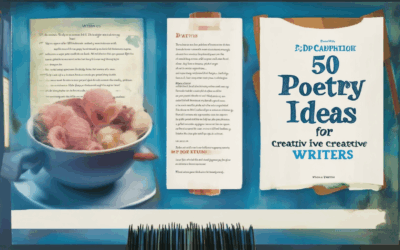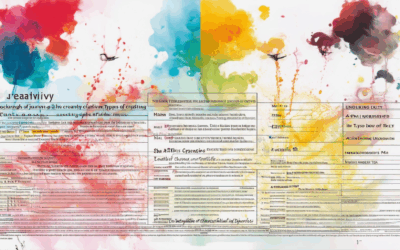Writing has long been recognized as a powerful tool for personal growth and self-discovery. Among its many forms, reflective writing stands out as a transformative practice that encourages introspection and fosters meaningful connections with oneself. Writing and reflection prompts, in particular, provide structured guidance for exploring complex emotions, experiences, and ideas, making them invaluable tools for anyone seeking to deepen their understanding of themselves. Whether you’re an aspiring writer, a student navigating academic challenges, or someone looking to enhance mental well-being, these prompts offer a unique pathway to self-reflection and creative expression. From unlocking creativity to fostering emotional resilience, writing and reflection prompts have proven to be versatile tools that can benefit a wide range of individuals, including teachers, students, and mental health advocates. This guide delves into the intricacies of these prompts, exploring their types, examples, and applications, while offering practical tips for effective use. By mastering the art of reflective writing, readers can unlock new dimensions of personal growth and discover the transformative power of these prompts.
Key Takeaways
- Leverage the Power of Writing Prompts: Unlock creativity, inspire action, and foster self-expression with tailored prompts.
- Enhance Self-Reflection and Growth: Use reflective prompts to delve into personal experiences and deepen your understanding of yourself.
- Explore Diverse Writing Types: Tailor your writing practice with creative, descriptive, or academic prompts to suit your specific needs.
- Overcome Writer’s Block: Dive into quick 5-minute prompts to maintain consistency and keep your creative flow active.
- Apply Writing Skills Across Industries: Utilize prompts in education, business, and art to enhance learning and professional development.
- Foster Idea Exploration and Emotional Expression: Discover new perspectives and emotional depths through guided writing exercises.
- Set Goals and Plan Strategically: Use prompts to clarify objectives and map out your path toward personal and professional achievements.
- Boost Writing Confidence and Skills: Regularly engage with prompts to refine your craft and build confidence in diverse writing styles.
- Connect with Others Through Shared Experiences: Share your writing journey and connect with like-minded individuals, fostering community and inspiration.
- Promote Mindfulness and Introspection: Reflect deeply through prompts that encourage mindfulness and introspective thinking.

Reflective Writing Prompts
Here are some thoughtfully crafted prompts for reflective writing, designed to inspire introspection and self-discovery:
Categories of Reflective Writing Prompts
- Personal Growth: Explore moments in your life that shaped who you are today.
- Creative Exploration: Describe a place that holds special meaning for you.
- Social Awareness: Reflect on how societal norms impact individual lives.
- Professional Development: Discuss a challenge you faced at work and what you learned from it.
Examples of Reflective Writing Prompts
- Write about a time when you felt misunderstood and how you coped with that emotion.
- Describe your ideal day and what activities would fill it.
- Reflect on a mistake you made and what you would do differently next time.
- Discuss the importance of friendships in your life and share a memorable story.
- Imagine yourself in the future and describe what you believe your legacy will be.
- Write about a skill you wish you had learned earlier in life and why.
- Describe a problem you solved and the steps you took to overcome it.
- Reflect on a time when you felt particularly proud of yourself and why.
- Write about a habit you want to change and what you plan to do about it.
Tips for Effective Reflective Writing
- Start Small: Begin with brief reflections to ease into the practice.
- Focus on Emotions: Pay attention to how feelings influence your thoughts.
- Set Intentions: Define your purpose before writing to guide your focus.
- Seek Inspiration: Use quotes, music, or art to spark your reflections.
By exploring these prompts and tips, you can delve deeper into your thoughts and experiences, fostering personal growth and self-awareness through the power of reflective writing.
Example of a Reflection Prompt
A reflection prompt is a thought-provoking question or statement designed to encourage introspection and deeper thinking. These prompts are often used in educational settings, particularly in ePortfolios, to help individuals articulate their learning experiences, personal growth, and professional development. Here are some examples of reflection prompts, inspired by Silken Drum’s approach:
- Reflect on your learning journey: “What has been your biggest challenge in this course, and how have you overcome it?”
- Self-Reflection on Growth: “Describe a moment when you felt you grew personally or academically. How did this moment shape your perspective?”
- Critical Thinking: “What are the key concepts you’ve learned in this module? How do you see these concepts applied in real-world scenarios?”
- Strengths and Weaknesses: “Identify your strongest skill in this course and one area where you feel you need improvement. What steps could you take to develop that skill?”
- Impact of Learning: “How do you think your understanding of [specific topic] has changed since the beginning of this course? What topics would you like to explore further?”
- Peer Feedback: “What feedback would you give to yourself if you were your own teacher? How does this feedback differ from what others might say?”
- Long-Term Impact: “How do you envision applying what you’ve learned in this course to your future career or personal projects?”
These prompts encourage individuals to reflect on their experiences, identify patterns, and articulate their growth. By using prompts like these, educators can help students develop critical thinking skills and a deeper understanding of their learning processes.
Silken Drum encourages writers and thinkers to explore these reflection prompts and share their insights in a supportive community. Explore more creative writing prompts and reflective exercises on Silken Drum .

Reflective Writing Examples
Reflective writing is a form of creative expression that focuses on introspection, personal growth, and exploring deeper aspects of life experiences. It often involves examining emotions, thoughts, and feelings to foster self-awareness and understanding. Below are some examples of reflective writing:
Categories of Reflective Writing
- Journals/Diaries: Personal accounts of daily life, emotions, and experiences. Example: Silken Drum Journal Writing
- Travel Logs: Documenting journeys, cultural experiences, and personal growth during travels. Example: Silken Drum Travel Journals
- Spiritual Journals: Records of spiritual reflections, meditation insights, and personal spiritual growth. Example: Silken Drum Spiritual Reflection
- Poetry: Expressions of emotion, thought, and imagery that invite readers to reflect on their own lives. Example: Silken Drum Poetry Collection
- Memoirs: Detailed recounts of a person’s life, focusing on significant events and personal development. Example: Silken Drum Memoir Writing
- Blog Posts: Personal musings on various topics, sharing insights and experiences with the broader audience. Example: Silken Drum Blog Writing
How to Approach Reflective Writing
- Choose a Prompt: Reflect on a specific event, emotion, or experience to guide your writing. Example prompts: “What did I learn from this challenge?” or “How has this experience changed me?”.
- Be Honest and Vulnerable: Allow your true feelings and thoughts to surface, making your writing authentic and relatable.
- Capture Moments: Write about meaningful moments in your life, whether big or small, to preserve memories and insights.
Why Reflective Writing Matters
Reflective writing offers numerous benefits, including emotional release, personal growth, and improved self-understanding. It can also serve as a therapeutic tool, helping individuals process complex emotions and experiences.
Getting Started
Start with a few minutes each day, dedicating time to reflect on your thoughts and experiences. Over time, you’ll develop a deeper connection with yourself and a richer vocabulary for expressing your insights.
Explore More on Silken Drum
Discover our comprehensive resources on reflective writing, including tips, inspiration, and community discussions. Visit our Reflective Writing Hub to dive deeper into the art of introspection.

Examples of Writing Prompts
- Creative Writing Prompts:
- Write a descriptive scene set in a magical forest.
- Create a character profile for a mysterious stranger you meet in a café.
- Describe your ideal fantasy world and its unique creatures.
- Write a letter to someone who has inspired you in your life.
- Reflection Prompts:
- What is one thing you’re grateful for today?
- What lesson have you learned from a past mistake?
- What would your ideal day look like?
- What is your personal definition of success?
- Academic Prompts:
- How can technology solve environmental issues?
- Explain the impact of social media on mental health.
- Write a persuasive essay arguing for stricter gun control laws.
- Describe the significance of a historical event you studied.
- Journaling Prompts:
- List five things you want to accomplish this week.
- What is your favorite childhood memory?
- Write about a challenge you overcame recently.
- What are your hopes for the future?
- Business Prompts:
- What is your company’s mission statement?
- How can we improve customer satisfaction?
- Write a pitch for a new product or service.
- What are your goals for the next quarter?
- Artistic Prompts:
- Paint a still life of a vase with flowers.
- Compose a song about love and heartbreak.
- Dance a routine inspired by a favorite movie scene.
- Write a poem about a sunset at sea.
- Seasonal Prompts:
- Write a story about a winter wonderland.
- Describe the sights, sounds, and smells of spring.
- Write a poem about summer nights.
- Imagine a perfect autumn day.
- Challenge Prompts:
- Read a book in a month and write reflections.
- Practice a new skill for 30 days.
- Start a fitness routine and track progress.
- Eat healthier meals for 21 days.
- Adventure Prompts:
- Plan a road trip across the USA.
- Become a local tourist in your city.
- Go on a solo camping adventure.
- Visit a new country and adapt to its culture.
What is a Good 5-Minute Writing Prompt?
A 5-minute writing prompt is a creative exercise designed to inspire quick, meaningful writing. These prompts are crafted to spark your imagination and help you overcome writer’s block. Here are some excellent examples:
- Write About Your Favorite Place: Describe in detail a location that holds special meaning to you. What makes it unique? What memories does it evoke?
- Your Perfect Day: Imagine the ideal day. What would you do? Who would you spend it with? What moments would you cherish?
- The Power of Words: Reflect on a time when words impacted you deeply. Was it a speech, a letter, or a conversation?
- Fearless Confession: Write about something you’ve been afraid to admit. What fears or secrets weigh on your mind?
- A New Beginning: Envision a fresh start. What goals would you set? How would your life change?
- Your Hero: Describe someone who inspires you. What qualities do they possess? How have they influenced you?
- The Last Meal: Think about your last meal on Earth. What would it be? Why?
- A Mistake You Made: Recall a regrettable decision. What could you have done differently? What did you learn?
- Your Superpower: Imagine having a unique ability. How would you use it? Who would benefit from it?
- A Time Travel Experience: If you could go back in time, what would you do? What would you change?
These prompts are perfect for sparking creativity and helping you write consistently. Whether you’re a seasoned writer or just starting out, these exercises will keep your momentum going!
Ready to explore more? Visit our Silken Drum platform for additional writing tips and inspiration.

What Are the Three Types of Writing Prompts?
Writing prompts are questions or statements designed to inspire creativity and guide writers in generating content. Below are the three primary types of writing prompts, along with examples to illustrate each:
1. Creative Writing Prompts
Creative writing prompts are designed to spark imagination and encourage storytelling. These prompts often ask writers to:
- Develop a unique character and plotline.
- Describe a scene or setting in detail.
- Explore a moral dilemma or ethical situation.
- Create a dialogue between two characters.
Example: “Write a scene where a character discovers a hidden talent they didn’t know they had.”
2. Reflective Writing Prompts
Reflective writing prompts focus on personal thoughts, emotions, and experiences. These prompts often ask writers to:
- Share a personal anecdote or memory.
- Reflect on a past event or decision.
- Express feelings or opinions about a particular topic.
- Imagine how life would change if a certain event occurred.
Example: “Write about a moment in your life where you felt completely lost, and how you found your way.”
3. Descriptive Writing Prompts
Descriptive writing prompts are meant to evoke vivid imagery and sensory details. These prompts often ask writers to:
- Describe a place you’ve never been before.
- Write about a sound, smell, or taste you associate with a memory.
- Paint a picture of a character through their appearance, actions, and surroundings.
- Detail a process, such as cooking a favorite dish or building something.
Example: “Describe the scene of your favorite childhood home, focusing on the smallest details.”
Conclusion
Writing prompts are a valuable tool for both experienced and aspiring writers. By exploring different types of prompts, writers can unlock new creative avenues and develop their skills in various genres. Whether you prefer creative, reflective, or descriptive prompts, finding the right ones can lead to meaningful and engaging writing experiences.




0 Comments